
Aedes aegypti is a species of mosquito that is a disease vector for several arboviral diseases such as dengue, Zika and chikungunya that affect millions of people globally. Many of these diseases do not have vaccines readily available, and so a lot of emphasis is put on controlling the spread of the vector. Molecular approaches to vector control have been emerging over the past ten years, with genetically modified mosquitoes being released into the wild to control breeding in mosquito populations.
Vinaya Shetty and colleagues have been looking at another way to disrupt mosquito populations, by investigating whether removing key genes related to the circadian clock of the mosquitoes could impact their clock-dependent biological processes.

Mosquitoes display time-related behaviours such as feeding at certain times of the day. For A. aegypti feeding is a day time activity – mainly in the early morning and late afternoon – whilst the anopheline mosquito is a nocturnal feeder.
In their 2022 study, Vinaya Shetty and colleagues knocked out the core clock cycle gene in A. aegypti using CRISPR/Cas9 and found the mRNA expression of 7 circadian related genes were changed. This knock out affected the mosquito’s longevity, feeding pattern and reproductive fitness. Their latest study explored this further by using transcriptome profiling and differential gene expression to determine the network of genes and biological pathways that were affected by disrupting the clock gene.
Differential gene expression enabled Shetty and colleagues to identify thousands of genes that were expressed differently in day-night cycles, and determine that removal of the cycle gene caused disruption in metabolic processes, signaling pathways and immune responses. This showed the vital role that the circadian clock plays in A. aegypti’s life, and targeting it could see massive changes to the mosquito’s behaviour and consequently neutralise its impact as a disease vector.

Comments